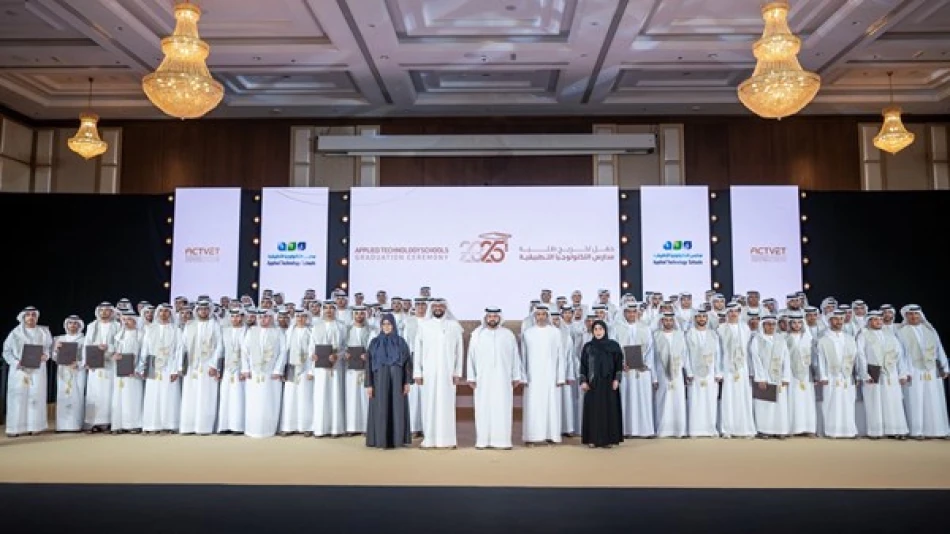
Sheikh Mohammed Witnesses Graduation of 112 Students from Applied Technology Schools
Fujairah Crown Prince Champions Technical Education as Key to UAE's Economic Future
The UAE's commitment to building a knowledge-based economy took center stage as Fujairah's Crown Prince Sheikh Mohammed bin Hamad Al Sharqi emphasized education's pivotal role in national development during a graduation ceremony for 112 students from the emirate's Applied Technology Schools. The event underscores the UAE's strategic pivot toward technical education as it seeks to diversify beyond oil dependency and compete in the global innovation economy.
Strategic Investment in Human Capital
During the ceremony held at Al Bahr Hotel and Resort, Crown Prince Sheikh Mohammed highlighted education as the foundation for building a future rooted in science, knowledge, and human capital development. His remarks align with the UAE's broader Vision 2071, which aims to make the country the world's best nation by the centennial of its founding.
The Crown Prince specifically praised Fujairah's ruler, Sheikh Hamad bin Mohammed Al Sharqi, for his commitment to advancing the education sector and supporting its requirements. This investment reflects a growing recognition across the Gulf that technical skills training is essential for economic competitiveness in an increasingly digital world.
Technical Education: The New Economic Engine
Addressing Skills Gap in Emerging Markets
The graduation of 112 students from Applied Technology Schools represents more than ceremonial achievement—it signals the UAE's systematic approach to addressing critical skills shortages in technology sectors. Similar initiatives in Singapore and South Korea have proven that technical education can serve as a catalyst for economic transformation, particularly in manufacturing, logistics, and digital services.
Fujairah's focus on applied technology education is particularly strategic given the emirate's position as a major shipping and logistics hub. The Port of Fujairah, one of the world's largest bunkering hubs, requires increasingly sophisticated technical expertise to maintain its competitive edge against rivals in Singapore and Rotterdam.
Regional Competition and Innovation
The emphasis on technical education places Fujairah in direct competition with other Gulf states pursuing similar strategies. Saudi Arabia's Vision 2030 includes massive investments in technical and vocational training, while Qatar has established specialized technical colleges ahead of its post-World Cup economic diversification plans.
The UAE's approach, however, distinguishes itself through its integration of applied technology programs with existing industrial infrastructure. This creates immediate pathways for graduates into high-demand sectors, potentially offering higher employment rates than traditional academic programs.
Market Implications and Economic Impact
For investors and businesses operating in the region, the focus on technical education signals several important trends. First, it suggests a more skilled workforce will be available for manufacturing and technology companies considering Middle East operations. Second, it indicates government commitment to supporting industries that require technical expertise, potentially making the UAE more attractive for foreign direct investment in these sectors.
The ceremony's emphasis on "supporting the state's developmental journey in various fields" suggests these graduates will be channeled into priority economic sectors, likely including renewable energy, advanced manufacturing, and digital services—all areas where the UAE seeks to establish regional leadership.
Building Tomorrow's Workforce Today
Crown Prince Sheikh Mohammed's call for graduates to "continue seeking knowledge and developing their skills" reflects an understanding that technical education must be continuous in rapidly evolving industries. This approach mirrors successful models in Germany and Switzerland, where technical education is closely linked to industry needs and includes ongoing professional development.
The recognition of the schools' administrative council and educational committee for maintaining "the highest standards of educational quality" suggests a systematic approach to quality assurance that could serve as a model for other emirates and regional competitors.
As the UAE positions itself for a post-oil future, investments in technical education represent a fundamental shift toward human capital as the primary driver of economic growth. The success of these programs will likely influence similar initiatives across the Gulf, making Fujairah's approach a closely watched experiment in economic diversification through education.
Most Viewed News

 Layla Al Mansoori
Layla Al Mansoori






